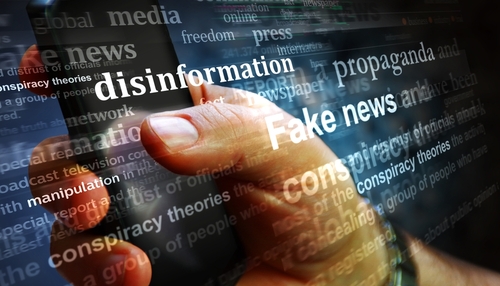Judge curbs US effort to battle disinformation on social media; will ruling withstand appeal?

Jameel Jaffer, executive director of the Knight First Amendment Institute at Columbia University, has criticized a judge’s opinion for adopting an “I-know-it-when-I-see-it” approach and for using a broad remedy regarding the judge’s decision on the Biden administration’s efforts to stop misinformation on social media. Image from Shutterstock.
The federal government has appealed a federal judge’s curbs on the Biden administration’s efforts to stop misinformation on social media.
The outcome of the case now before the 5th U.S. Circuit Court of Appeals at New Orleans “could shape the future of First Amendment law in a rapidly changing media environment,” the New York Times reports.
Jonathan Turley, a professor at the George Washington University Law School, applauded the July 4 injunction issued by Chief U.S. District Judge Terry A. Doughty of the Western District of Louisiana, Reuters reports. Yet Turley said the two states that obtained the injunction, Louisiana and Missouri, “will have a difficult time on appeal because it is such a rare and novel order.”
The states’ lawsuit had argued that the Biden administration was trying to silence speakers who objected to COVID-19 policies and people who questioned the validity of the 2020 presidential election, Bloomberg Law reports.
Doughty’s order applies to a range of federal officials, including employees with the Centers for Disease Control and Prevention, the FBI, the Department of Justice and the Department of Homeland Security.
The order bars the officials from communicating with social media companies for “the purpose of urging, encouraging, pressuring or inducing in any manner the removal, deletion, suppression or reduction of content containing protected free speech.”
Doughty did not block government communications about posts related to criminal activity, national security threats and foreign election interference, however. Doughty is an appointee of former President Donald Trump.
“If the allegations made by plaintiffs are true,” wrote Doughty in a separate opinion, “the present case arguably involves the most massive attack against free speech in United States’ history. In their attempts to suppress alleged disinformation, the federal government, and particularly the defendants named here, are alleged to have blatantly ignored the First Amendment’s right to free speech.
“Although the censorship alleged in this case almost exclusively targeted conservative speech, the issues raised herein go beyond party lines. The right to free speech is not a member of any political party and does not hold any political ideology,” he wrote.
The government has argued that there is no longer any dispute because its communications with social media companies ended more than a year ago. The United States also maintains that the companies made their own decisions about the posts at issue.
Among the experts contacted by Reuters was Jameel Jaffer, executive director of the Knight First Amendment Institute at Columbia University. He said Doughty’s decision raises “difficult First Amendment questions,” but it “doesn’t really offer any principled way of separating legitimate government speech from illegitimate government coercion.”
Jaffer criticized Doughty’s opinion for adopting an “I-know-it-when-I-see-it” approach and for using a broad remedy.
Genevieve Lakier, a professor at the University of Chicago Law School, told the New York Times that Doughty’s rulings are “pretty significant departures from precedent.”
“Are government officials supposed to figure out for themselves what’s the serious-enough threat that they can communicate about it to the platforms or not serious and then they cannot?” Lakier said. “How are they going to draw this line?”
The case is Missouri v. Biden.
Write a letter to the editor, share a story tip or update, or report an error.



